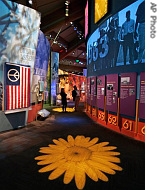VOA标准英语2008年-New York Museum Celebrates Legacy of Woodstock
搜索关注在线英语听力室公众号:tingroom,领取免费英语资料大礼包。
(单词翻译)
By Kate Miller1
New York
06 June 2008
Relive the decade of the sixties, a time of change and transformation2, at the new Museum at Bethel Woods in New York State. The museum explores the experience of the 1969 Woodstock festival, one of the iconic events of the 1960s. From VOA's New York Bureau, Kate Miller reports on a museum that uses modern day technology to celebrate the music and culture of the radical3 decade.
 |
| The Woodstock Museum at Bethel Woods, New York, 15 May 2008 |
The museum is part of the larger Bethel Woods Center for the Arts, an outdoor performing arts center. The complex is set among the rolling hills of upstate New York at the historic site of the original 1969 Woodstock Music and Art Fair.
The now famous Woodstock festival, overcoming a rocky start, turned into three days of celebration and music in a decade known for its turbulence5. The museum includes numerous artifacts, photographic murals, a psychedelic colored hippie bus, and films taken at the festival.
Wade6 Lawrence, Director of The Museum at Bethel Woods, reflects on the ten years of strife7 and controversy8.
"The 1960s were a pivotal time in American culture, world culture, both politically and culturally," he noted9. "And the Woodstock Festival could not have happened if not for the events leading up to it, the Kennedy election to the Kennedy assassination10, to the tumultuous events of 1968. To the escalation11 of the war in Vietnam, civil rights movement, the birth of the women's movement, all of these things had their genesis in the 60s, and Woodstock brought together an entire generation of young people who were questioning authority, questioning the path their parents had chosen."
American culture changed dramatically during the 60s, and that change inspired a group of music lovers to create the largest music festival of all time. Their idea became the exclamation12 point of that decade. Patrick Gallagher, the museum designer, sees it as such a moment.
"It's a watershed13 event in American cultural history," he explained. "It's one of those things that when you talk to people, historians, musicians, people that have really studied culture, pop culture; it's a point of reference. It is like the closing of one of the greatest, most tumultuous, most amazing decades, and that was the 60s."
After months of planning, the Woodstock Festival leaders had to deal with a last minute relocation crisis, no money, an overflowing14 crowd of 500,000 people and the shut down of the highway. Then, a torrential rainstorm hit the concert.
Souful singer Richie Havens15 was the first to perform. It was almost impossible to get through the huge crowds, so he was helicoptered in, and had to play so long he ran out of material. Desperate for something to sing, fueled by inspiration and the upheaval16 of the times, he gave voice to a song called "Freedom".
At a ceremony previewing the museum, Havens remembered Woodstock.
"Even those who got soaking wet for three days and stayed, what could you say, you know? It's like, they're not going anywhere now, that's it, ya know, I'm here for the duration, and til it's over, this is where I'll be," he recalled.
Many of the area residents pitched in to help supply the mud-covered, drug-using, joyful17 concertgoers with food and water.
The Lovin' Spoonful's John Sebastian was there, savoring18 the music as a member of the audience, but in the freewheeling spirit of the event he ended up on stage performing.
"My favorite performance was Creedence Clearwater," he said. "I guess John Fogerty didn't think their performance was up to par4, but as an audience member I was just totally twisted, I thought wow, what a great three piece band."
Another Woodstock hippy original was Duke Devlin, who came from Texas to participate, and never left.
"The other side of the road over there, where the barn was, we had the artist pavilion," he noted. "Where that field is over there, that green over there, was the heliport right over there."
Devlin has a true flower child's look at the present, and the past.
"You know I always say the reason we're all here is because we're not all there," he added.
So take a step back in time, and experience an event and a decade that remains19 a defining moment in history.
 收听单词发音
收听单词发音 




